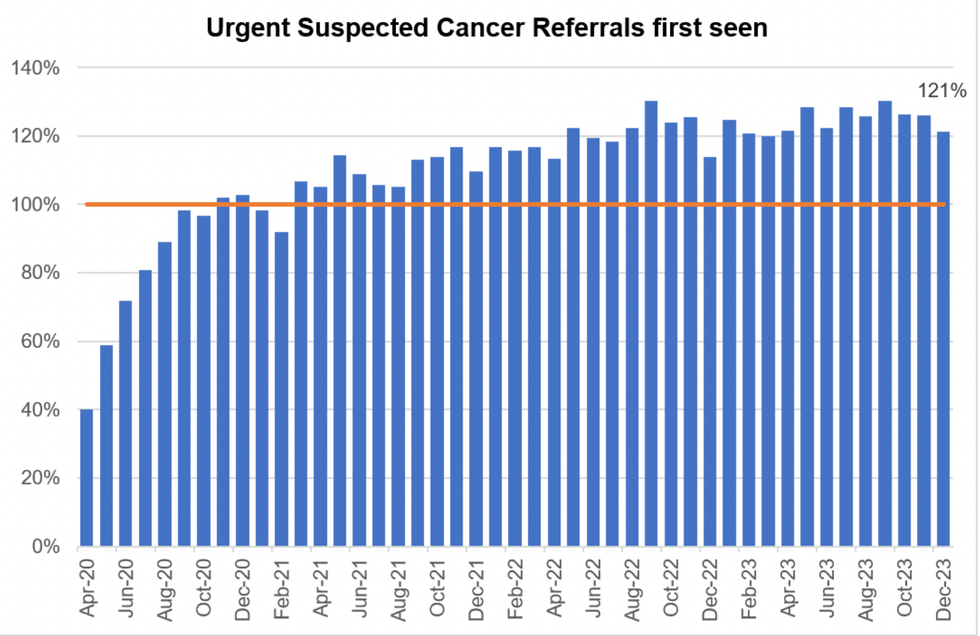Gynaecologist reveals the 'subtle' signs of cancer young women are missing following Kate's shock diagnosis
Research has found that 43 percent of women are not confident in checking themselves for cancer symptoms
Princess Kate did not specify the type of cancer she has but her heartbreaking announcement shines a light on a worrying trend
Don't Miss
Most Read
Trending on GB News
Princess Kate revealed last Friday that she is undergoing preventative chemotherapy after cancer was picked up in tests.
The royal did not disclose the type of cancer she has but her admission sparked an outpouring of sympathy and support. It also drew attention to a concerning trend: too many young women are potentially missing the warning signs of cancer.
It comes after research conducted by Pall Mall Medical found that 43 percent of women are not confident in checking themselves for cancer symptoms, 35 percent of women admit to not checking their bodies at least once a month for abnormalities or changes and a shocking one in 10 (nine percent) have never checked themselves.
Without speculating on Kate's specific cancer, rates of cervical cancer speak to the urgent need to improve screening and awareness of the warning signs.

Without speculating on Kate's specific cancer, rates of cervical cancer rates speak to the need to improve screening
Getty Images
NHS figures show that one in three women don’t take up their offer to be screened and yet cervical cancer is the second most common cancer amongst women in England under 35.
Cervical cancer can present with "subtle" symptoms at first so it's easily missed, consultant gynaecologist and obstetrician Ashfaq Khan tells GB News.
Subtle signs include:
Abnormal vaginal discharge
Pelvic pain
Pain during intercourse
Postcoital bleeding.
Urinary symptoms like frequency or difficulty urinating, leg swelling, unexplained weight loss, and persistent fatigue can also indicate cervical cancer, particularly in advanced stages, the Harley Street gynaecologist explains.
Women should be vigilant for changes in vaginal discharge consistency, colour, or odour, as well as any new or unexplained pelvic pain or discomfort during intercourse, he continues.
"Postcoital bleeding, urinary symptoms, leg swelling, unexplained weight loss, and persistent fatigue warrant medical evaluation.
"Regular cervical cancer screenings, such as Pap tests and HPV tests, are essential for early detection and prevention of cervical cancer," Doctor Khan added.
Research by Pall Mall Medical suggests this message is not cutting through.
LATEST DEVELOPMENTS

GPs have been referring people for urgent cancer checks in record numbers since March 2021
NHS
The research found:
- 45 percent of women admit to never having had a smear test
- 56 percent of women admit to never having had a breast examination for breast cancer
- 29 percent of women admit to not attending some or any of the cancer screening appointments that have been offered to them
- 62 percent of women would like to be more knowledgeable about the potential signs of cancer to look out for
- 56 percent of women would have attended cancer screening programmes sooner if they had been offered them at an earlier stage
Doctor Mariyam Malik, GP at Pall Mall Medical said: “The results of our research have been quite alarming to me as a medical professional, particularly the findings about women’s awareness of checking their own bodies for abnormalities and changes.
“I encourage all of my patients to check their bodies every single month. Put a reminder in your phone for the first of every month to ‘Feel it on the First’ and learn the key things to look out for when checking your body for potential signs of cancer.
“If you are invited for any type of cancer screening, I urge you to attend these appointments. If you are unable to attend the appointment given to you, call up to rearrange – don’t put it off. These types of appointments are usually quick, painless and are crucial for the early detection of cancer.”








